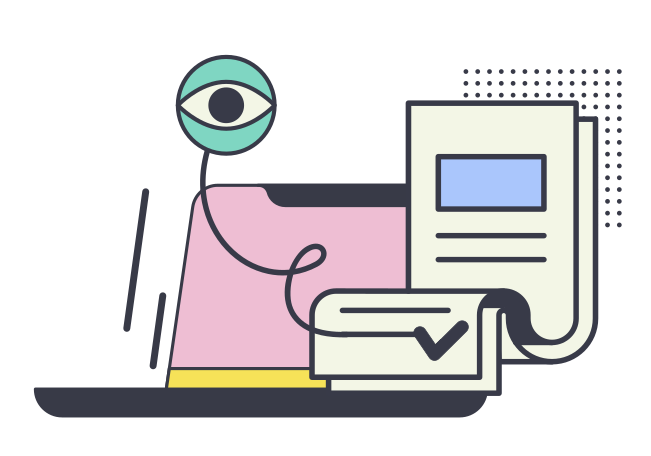Unfortunately, no matter who you are, layoffs may be unavoidable. Especially in the wake of COVID-19, thousands and thousands of people were recently laid off or furloughed.
With the recent events in the economy in 2022, layoffs have unfortunately become a norm in the tech industry.
One common question we get from folks who are laid off is what to say when your interviewer asks why you were laid off from your previous job.
For many candidates, these questions can feel tricky or difficult to answer. However, while some employers may have a stigma surrounding layoffs, there are effective ways to address this concern.
Answering interview questions about getting laid off can be done smoothly without undermining your interview prospects, as long as you follow the 10 rules of thumb below.
If done right, you can make a layoff from a previous position work for you rather than against you.
Suppose there is a gap on your resume from your last job, whether from a layoff, a termination, or quitting. In that case, a prospective employer will likely ask about it.
It's no secret that prospective employers don't like seeing lengthy employment gaps on resumes, no matter the reason.
Potential employers will ask about these gaps simply because they want to know why it was that you were unemployed. Needless to say, the reason may be directly relevant to your candidacy.
While being laid off is generally not seen negatively on your performance, it is still necessary to assure your interviewer that your layoff was not because of poor performance or productivity.
First and foremost, you must come prepared to provide the details surrounding your layoff.
Employers know, especially following COVID, that layoffs may have been outside a candidate's control. For example, perhaps the company was hemorrhaging cash and needed to cut costs to prevent going out of business. Or maybe your company was bought out and all its staff was laid off.
Keep these 10 rules of thumb in mind when explaining a layoff in a job interview:
- Always be upfront and honest,
- Don't wait for your interviewer; bring it up yourself,
- Back up your answer with numbers and data,
- Keep your answer simple and to the point,
- Discuss how you developed when you were unemployed,
- Stay positive and optimistic,
- Shine a spotlight on your track record,
- Come prepared with references,
- Distinguish the role or company you're applying to from the one you were laid off from,
- Leverage your connections and professional network
Always Be Upfront and Honest
The most important thing to remember when answering any questions about layoffs in your interview is to always be upfront and honest.
You may be wondering: should you tell an interviewer you were laid off?
Yes, you should always be honest and upfront about being laid off.
It's not a good idea to try to hide that you were laid off or act tight-lipped or reserved when the topic comes up.
Doing so can only reflect poorly on you. After all, being laid off may genuinely not have been your fault or because of personal performance issues.
However, acting shady or dishonest about it will make it seem otherwise.
Not to mention that this untrustworthiness can negatively affect the rest of your candidacy. No hiring manager wants to bring someone on that they can't trust to tell the truth about difficult situations.
Always be honest and upfront about being laid off in an interview.
Don't Wait For Your Interviewer; Bring It Up Yourself.
To that end, it's even better if you get out ahead of it.
Don't wait for your interviewer to bring it up, or worse, hope they simply don't. Bring it up yourself.
Doing so will accomplish two things:
First, it demonstrates your honesty and respect for the interviewer and the organization you are applying to. Second, it projects a significant amount of confidence, which, in turn, will command respect from the interviewer.
As we mentioned, being laid off isn't easy. It can damage one's self-confidence and sense of job security. As such, talking about it isn't easy either.
But that's precisely why getting out in front of it is so respectable.
Back-Up Your Answer with Numbers and Data
It's also good to help contextualize your explanation with numbers and data surrounding the layoffs.
Which numbers are relevant and which aren't will depend on the circumstances,
For instance, let's say your previous employer was bought out by another, and you were subsequently laid off. In that case, it'd be essential to point out that in most mergers & acquisitions, 30% of the employees of the purchased company are seen as redundant and laid off.
As we said, these numbers can help contextualize your situation and demonstrate that your layoff was not due to job performance or productivity issues (the primary thing an employer would be concerned about in this scenario).

Keep Your Answer Simple and to the Point
With all that being said, remember to keep your explanation brief.
The reasoning or circumstances behind your layoffs should not be a significant focus of your interview.
Instead, you and your interviewer should only take a few minutes to discuss it and move on to the real meat and potatoes.
If you need to explain why you were laid off in an interview, keep your answer simple, straightforward, and to the point.
Michael always says, "K-I-S-S. Keep it simple, stupid." Great advice. Hurts my feelings every time. Dwight Schrute
Provide context, yes, but don't ramble. The more excessive detail you include, the more you'll come across as dishonest or like you're overcompensating. This could make your interviewer think that the layoff may have been your fault.
You'll only have a limited amount of time during your interview to make a great impression. So don't waste it discussing what should be a relatively minor topic and issue.
Discuss How You Developed When You Were Unemployed
If you have to spend some time unemployed, you should always stay busy with professional growth on top of looking for another job.
Just because you have to send out resumes and prepare for interviews doesn't mean you can slack in the professional development department.
Chances are, if you have any gap in employment on your resume, your interviewer will ask you explicitly what you did during that time.
If the best answer you have is "I spent time looking for a new job," they will likely be unimpressed or downright disappointed.
Stay Positive and Optimistic
You must stay positive, optimistic, and confident when answering interview questions about layoffs.
In fact, it's critical to remain positive and optimistic for all the interview questions coming your way.
You should avoid describing the circumstances of your layoff in excessively negative or bitter terms, especially about your former employer.
Instead, maintain an upbeat demeanor throughout your interview.
This will accomplish a few things for you. First, staying positive will help calm any nerves you may have before or during your interview. Second, it will help your body language come across as more confident, which is vital for this and other interview questions.

Shine a Spotlight on Your Track Record
You may be surprised how little being laid off actually means in the end.
Suppose you have a solid track record of reliable performance in your previous positions. In that case, even if you were laid off from them, your interviewer will probably not be too hung up on it.
At the end of the day, the only genuine reason an employer would hold a layoff against you is if it happened because of performance reasons.
As such, an easy way to reassure them is to highlight that you are a strong candidate with a proven track record of success.
Come Prepared With References
Similarly, coming into your interview with a list of references from a past employer, customers, or colleagues can also go a long way.
It's one thing for you, yourself, to highlight your track record. It's another to have others who can back you up on it.
If you were laid off, it's wise to contact as many references as possible who have direct knowledge or experience of the layoffs.
For instance, if you have a former manager as a reference, they can potentially reassure a potential employer the layoff had nothing to do with performance.
Distinguish The Role or Company You're Applying To From The One You Were Laid Off From
No matter why you were laid off, one of the best attitudes you can bring into new interviews is that it ultimately was a blessing in disguise.
If there is a subtext of, "yeah, it sucks I got laid off, but this new role/company is a much better fit for me," your previous layoffs shouldn't be a problem during your interview.
Leverage Your Connections and Professional Network
Finally, if you leverage your professional connections and network, you can significantly improve the chances of a favorable hiring decision.
This goes beyond just questions about being laid off but is excellent advice for all interviews.
In fact, employee referrals are the top source of new hires, according to data from the talent management software company SilkRoad. Referrals were responsible for 40% of interviews in 2016 and 37% of job offers.
Suppose, before your interviews, you've gotten referrals from employees or hiring managers at the company. In that case, you have a great shot of getting a job offer if you ace your interviews, even with previous layoffs on your resume.

Ace the Rest of the Interview
Finally, after all these 10 steps, the final impactful thing you can do is give an outstanding performance in the rest of the interview.
The best-case scenario is that you rock the socks off your interviewers to the point where any layoffs or current employment status on your resume barely matter to them.
Fortunately for you, you're in the right place.
Here at Exponent, we've helped thousands and thousands of candidates on the job hunt in dozens of tech roles prepare for their upcoming interviews with various resources.
If you're interested in using them to help you ace any interview process coming your way, be sure to:
💬 Study up on example interview questions
📖 Read through our company-specific interview guides
👯♂️ Practice your interviewing skills with our peer-to-peer mock interview practice tool.
👨🎓 Take one of our complete interview courses
Everything you need to know for your next interview
Create your free Exponent account and learn how to ace your interviews.
Get started free ->Your Exponent membership awaits.
Exponent is the fastest-growing tech interview prep platform. Get free interview guides, insider tips, and courses.
Create your free accountRelated Blog Posts

Meta Layoffs Tracker

How Do You Talk About Being Laid Off in a Mass Layoff?


